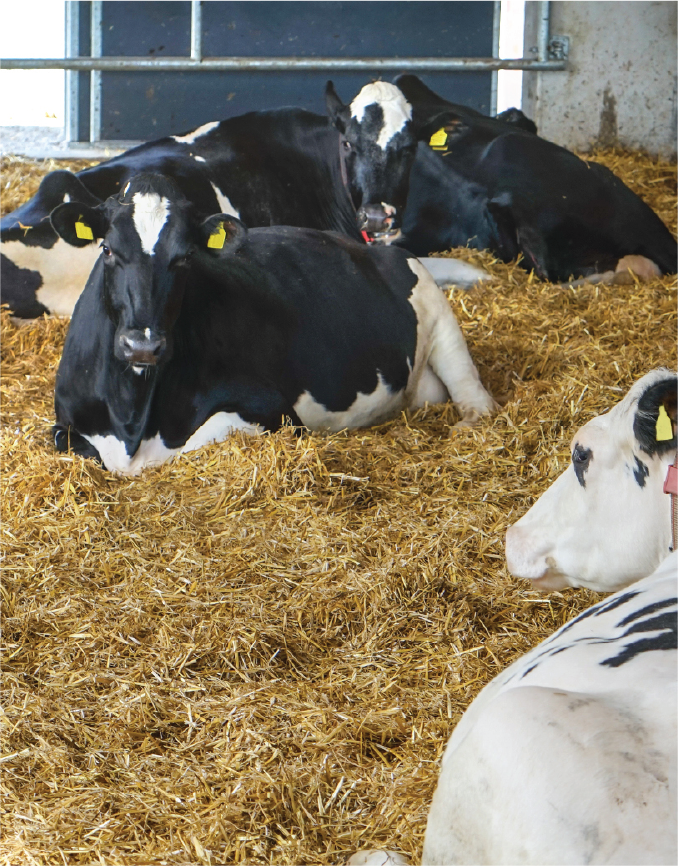Don’t fall for these core-antigen vaccine myths
By John Champagne, D.V.M., M.P.V.M., Cattle Technical Services, Merck Animal Health

Proper use of a core-antigen vaccine can help reduce the number of new Gram-negative intramammary infections (IMIs). Unfortunately, common myths persist about the use of core-antigen vaccines. Understanding how these vaccines work can clear up these misconceptions.
Myth 1: Core-antigen vaccines prevent infection.
Vaccination does not prevent the presence of E. coli in the mammary gland. Core-antigen vaccines like BOVILIS®J-5 will not stop E. coli IMIs but instead reduce the level and severity of new infections. When administered properly, successful immunization can reduce mastitis severity, milk loss, culling and death associated with E. coli infections.
Myth 2: Core-antigen vaccines offer protection against all types of mastitis.
Core-antigen vaccines are used to trigger an immune response to Gram-negative coliform bacteria like E. coli. These vaccines have no effect on mastitis caused by staphylococci, streptococci, or other Gram-positive bacteria. Clinical mastitis cases caused by Gram-negative pathogens are common during the early stages of lactation.
Myth 3: Core-antigen vaccines offer the best protection when given at dry-off and at calving.
The lapse of time between dry-off and calving is too great for animals to adequately respond to a core-antigen vaccine with adequate protective antibody production.
For maximum protection, it is important to administer an initial dose of BOVILIS J-5 at dry-off to prime the immune system. Two follow-up doses are recommended at four- and six-week intervals to build up immunity levels against coliform bacteria. A third and final dose is given after calving to help sustain a cow’s antibody levels into the first months of lactation, when she is more susceptible to coliform mastitis. Always follow label instructions, and do not vaccinate within two weeks prior to calving.
Myth 4: Coliform mastitis vaccines work in any situation.
Combine sound management practices with the proper use of core-antigen vaccines to help achieve success against environmental coliform pathogens. Provide clean, dry bedding, fresh water sources, adequate bunk and resting space and proper hygiene in the maternity pen. Also, reduce stressors that can impact the cow’s immune response.
Myth 5: Cows with clinical mastitis regardless of cause will benefit from vaccination with a core-antigen vaccine.
Core-antigen vaccines are not treatments. Rather, they aid in a cow’s ability to prevent IMIs from becoming severe. Research shows core-antigen vaccines decrease the incidence and severity of clinical coliform mastitis (CCM) cases and should not be used to treat Gram-positive infections.1
Myth 6: Core-antigen vaccines should not be administered in conjunction with other vaccines.
No more than two Gram-negative vaccines should be given at one time to avoid potential adverse endotoxin effects, which can include fever, lack of appetite, depression, shock, abortion and even death. Not all core-antigen vaccines are the same; look for a vaccine that has its endotoxin level printed on the bottle for confident product use and safety in your herd.
Work with your veterinarian, and always follow label directions for handling, storing and administering vaccines.
IMPORTANT SAFETY INFORMATION FOR BOVILIS J-5: This product contains oil adjuvant. In the event of accidental self-injection, seek medical attention immediately. For additional information, see the product label.
Reference:
1. Wilson, D., et al. Milk production change following clinical mastitis and reproductive performance compared among J5 vaccinated and control dairy cattle. J. Dairy Sci. 2008:91(10):3869-3879.
